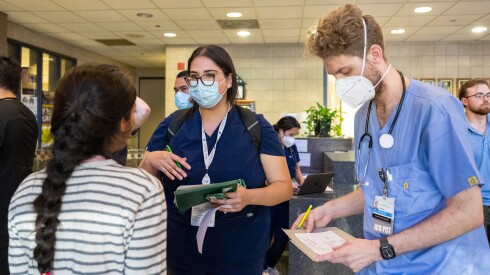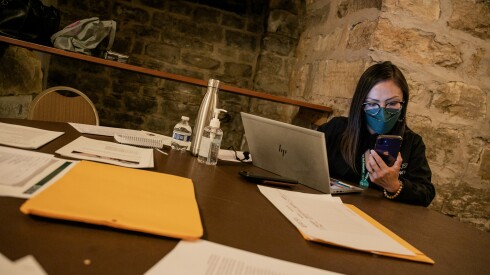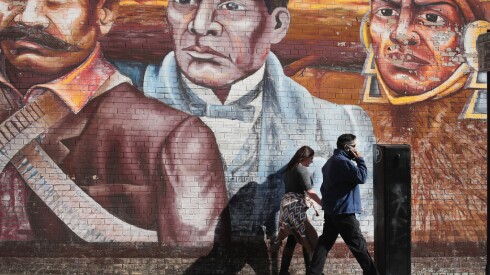As federal agents continue to carry out deportation raids in Chicago at the direction of the Trump administration, the most important thing for residents is to be informed and prepared, community groups and officials with the Mexican consulate said.
Reyna Torres Mendivil, Consul General of Mexico in Chicago, and Jorge Mújica, community organizer with Arise Chicago, emphasized that community members need to remain informed.
“We have been preparing for this situation for months,” Torres Mendivil said in an interview with La Voz.
The Mexican government has the most consulates in the United States, 53 in total, compared to other countries, as the majority of immigrants are of Mexican origin. Torres Mendivil explained that they are in constant communication with other consulates in the country and theirs covers a population of 3 million people in Illinois and northern Indiana.
“What we tell the community is to make a list and check it off: have their passport, consular registration, birth certificate, [prescriptions] if they know they need medicine, and bank accounts in order,” Torres Mendivil explained.
“We always tell them it’s important to register their children as Mexican [nationals] as well. Many children have been repatriated. Everything is made easier if they register their children as Mexicans and if they have dual citizenship.”
This is where the role of the Consulate comes into play, she said, helping with the full spectrum of different needs the community may have in a situation like this, “starting with the most basic things, which have to do with obtaining their identification documents and ensuring they are up to date.”
To this end, many procedures have been streamlined, such as obtaining dual nationality or registering the children of Mexicans born in the United States. This, she said, is due to a digitalization effort by the Mexican government, and part of this is why the services are provided by the consulates.
“Many people began documentation procedures in the past and don’t know their status, or perhaps they had a lawyer who they later never heard from and they’re unsure of their status,” the Consul explained.
And two things can happen: many people who have even missed court hearings may even have a deportation order and don’t know about it, or others who may be eligible for immigration relief and don’t know about it either. That’s why it’s important to talk to lawyers and learn about their options, he explained.
Jorge Mújica, strategic campaign organizer for the labor organization Arise Chicago, has held advocacy workshops to inform the community about their rights.
“When there are raids, they won’t give any warning,” Mújica warned. “The agents work 40 hours a week, and their job is to deport people. There can always be operations.”
He emphasized that the word “raid” refers to “casting a net” and thereby rounding up several people, which is not the same as when they explicitly have a target with a warrant.
“The point is that you have to be prepared, you have to know your rights, you have to know how to act, have your documents ready, be prepared, don’t panic; that doesn’t make sense,” he emphasized.
The Castañón Nava case
Mújica cited the Castañón Nava case from May 29, 2018. In this case, five non-citizens and two immigrant rights organizations, the Illinois Coalition for Immigrant and Refugee Rights (ICIRR) and Organized Communities Against Deportations (OCAD), filed a class-action lawsuit challenging warrantless arrests during U.S. Immigration and Customs Enforcement (ICE) enforcement operations.
Among other things, the plaintiffs alleged that ICE had a practice of making warrantless arrests, including during traffic stops. On Nov. 30, 2021, the parties signed an agreement, which sets forth discrete terms and conditions, which was approved by the court on Feb. 8, 2022.
In May 2022, as part of the agreement, ICE issued a new national policy on warrantless arrests and vehicle stops. This policy and agreement are in effect until May 13 of this year.
To provide advice and referrals to attorneys, the Mexican Consulate in Chicago works with community organizations. “We coordinate all legal matters while working with the Resurrection Project and many organizations, such as ICIRR. We are part of this network of attorneys and organizations that serve the community,” Torres Mendivil said.
“Each case is a tragedy, but we can’t prevent all cases, so we must be well informed,” Mújica said.




